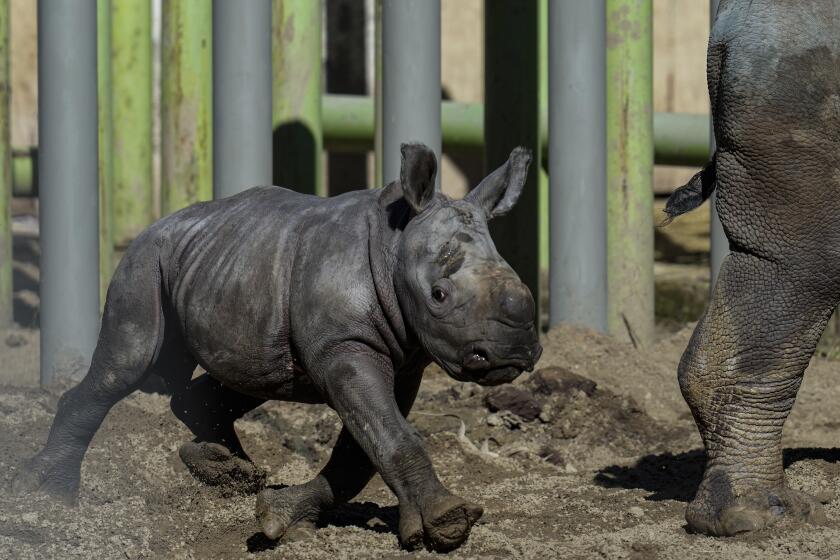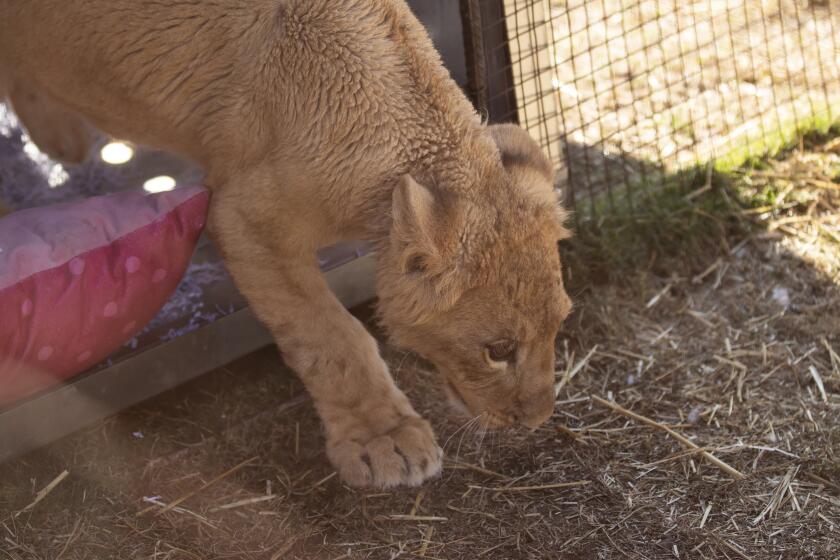‘Yo Quiero RESPECT’
You have to put yourself in the position of a Chihuahua--which is 10 inches off the ground, tops--to understand why the little dogs have gotten such a bad rap. Here you are, standing up your straightest, and you’re still too short to see or be seen. Yap yap, nip nip. If you don’t dance around and make noise, you could accidentally be trampled to death. So what if they say you look like a tipsy rodent and sound like a car alarm? So what if they mock your penchant for lolling in human laps? Does that make you any less of a dog? Don’t they know a canine can be teensy on the outside and a giant within?
Now they do.
“Yo quiero Taco Bell.”
That line--”I want some Taco Bell”--may have saved the the breed’s reputation. Suddenly, Chihuahuas have taken off, earned the dignity they deserve, been granted their overdue 15 minutes of fame.
Suddenly, those big Chihuahua personalities are exploding out of 6-pound bodies topped by tiny apple-shaped heads, and onto the small home screen.
“People are getting a look at how big in spirit these little dogs are,” says Sandra Whittle, of Chesterfield, Va., who breeds Chihuahuas and is president of the Chihuahua Club of America. The Taco Bell campaign is good PR for the often-misperceived breed, she says. It shows the dogs as they are: personable, intelligent and energetic, rather than as airhead accessories for people to use as live fashion props. “Speaking for myself and not the club, I like the dogs in the ads. I’m not sure they conform to breed standard.”
By this she means the official American Kennel Club standard, which simply states that a Chihuahua is “a graceful, alert, swift-moving little dog with saucy expression . . . and terrier qualities of temperament . . . not to exceed 6 pounds.” The dogs are generally thought to have been miniaturized in China centuries ago and transported to the state of Chihuahua in Mexico, from which their name comes. Whittle says her phone has been “ringing off the hook” with potential customers since the Taco Bell ads began to air.
Breeders and pet stores now have Chihuahua waiting lists. Some people don’t even ask for the critters by name, requesting only to see “a Taco Bell kind of dog.”
At Pet Love, in the Beverly Center, six of seven Chihuahuas from a recent shipment were sold within a week. They are registered with the American Kennel Club and sell for $1,100 each, says Celerino Evangelista, who works at the store.
“They’re cute, have great temperaments and are economical to own,” he says. “It’s like buying a small car instead of an SUV. They eat little, poop little and you can park them anywhere.”
And all it took was two ad guys sitting in a Venice cafe. Or in a Michigan warehouse, depending on whom you believe--litigation is pending on the matter of who came up with the Chihuahua idea. The two-man Wrench Co. of Grand Rapids, Mich., claims it held ongoing talks with Taco Bell last year in an effort to turn its own creation, Psycho Chihuahua, into the fast-food firm’s mascot. Taco Bell acknowledges it held discussions with Wrench, but not for that purpose. Two creative directors from Taco Bell’s Venice-based ad agency, Chiat / Day, came up with the “Yo Quiero” Chihuahua concept, claims Taco Bell, which is headquartered in Irvine. The company says Clay Williams and Chuck Bennett were at a beach cafe when the sight of a dog on a mission gave them the idea.
Chihuahuas also have Dinky and Gidget to thank. They’re the DiCaprio and Winslet of the Chihuahua set, overnight stars of the “Yo Quiero” commercial that was filmed last year in Miami. Dinky also starred in the subsequent El Pollo Loco commercial that spoofed the Taco Bell campaign.
In fact, Dinky and Gidget are such hot dogs these days that neither they, nor the people who surround them, are allowed to talk to the press.
“We are under exclusive contract to Taco Bell. We cannot discuss particulars of the commercials or the specific dogs, their names, weights, ages or anything else,” says a good-natured Joel Silverman, dog trainer for Steve Martin’s Working Wildlife company in Frazier Park, in Kern County. That’s where Dinky and Gidget currently live. Silverman did allow, while talking about employable dogs in general, that the best actors are usually not pure bred, but mixed mutts who would not win any ribbons in American Kennel Club shows. They often come from shelters, he says.
Joe Gherrera, a vice president of El Pollo Loco, on the other hand, is happy to have a Chihuahua chat.
“The Taco Bell dog was too fun of a target to pass up,” he says. So the firm’s ad agency at the time created an ad in which comedian Paul Rodriguez tells the Cary Grant of Chihuahuas about the dangers of eating too many tacos.
“Ay, ay, ay,” the little Sino-Mexican dog replies. “The minute our ad aired, Dinky and Gidget got an exclusive contract from Taco Bell, to keep us and anyone else from getting hold of them again.”
Gherrera is one of millions who’s never known a Chihuahua before and never really considered having such a pocket pet. But the public loves the dog, he says.
Taco Bell spokeswoman Laurie Gannon says Dinky and Gidget are such a hit that the company is flooded with e-mail, dog resumes and calls.
“It’s just becoming a craze across the country,” she says. “Our dogs have had requests to be on ‘Regis and Kathie Lee,’ ‘Access Hollywood,’ ‘Entertainment Tonight,’ ‘Hard Copy,’ the Discovery Channel and many, many more.” So now, four dogs are under contract, she says, because Dinky and Gidget each need a double. Taco Bell employees, who’ve been given T-shirts with a Chihuahua pictured on the front, have been offered up to $50 for the shirts.
Whittle, other breeders and pet store personnel say it’s not true that Chihuahuas are an overnight success. The American Kennel Club ranks them 12th in popularity among 140 breeds.
“They’ve been quietly popular all along,” says Bill Bonham of Somis, in Ventura County, who has three Chihuahua pets and, with partner Karen Enriquez, breeds others for sale. “The Chihuahua’s biggest boosters--and some of my best customers--are those big, burly, macho guys who drive 18-wheel trucks. This is a man’s kind of dog,” Bonham explains. “It’s small and economical enough to travel in tight quarters, it’s the greatest companion you could have, it’s incredibly loyal and loving and smart enough to keep criminals at bay. They can hear a stranger’s heartbeat from dozens of feet away. And they’ll bark up a storm to let you know.”
Bonham’s hardly a wimp himself. A 6-foot former boxer and tree maintenance man, he became intrigued by Chihuahuas on a 20-below-zero day while studying a huge oak in the Ozarks.
“Suddenly I saw this little dog, brown and tan, standing there shivering to death. He started to cross the road to me just as a speeding car came through,” Bonham says. “That little thing ran right under the moving car and never got hit. I scooped him up, put him in my jacket, and took him to a convenience store for a hot dog treat. I realized right then this little dog needed me. A Rottweiler don’t need some tough guy to take care of him. A Chihuahua? He needs all the help he can get.”
But Bonham, Whittle and others who care about the breed all say they worry about the same thing: “Remember what happened when ‘101 Dalmatians’ came out?” Bonham asks. “People bought those dogs without knowing a thing about their special needs. . . . A year later, the shelters were full of Dalmatians. We don’t want that to happen to these little guys.”
Whittle agrees. The dogs are strong but vulnerable, she says.
“Chihuahuas don’t belong in families with kids of any age. Because no matter how caring and compassionate the kids are, they’re bound to accidentally step on, sit on or kick the little dogs, who are always hiding under cushions or getting entwined with people’s feet. It’s unfair to the child and the dog, to put such a burden on them.”
More to Read
Start your day right
Sign up for Essential California for news, features and recommendations from the L.A. Times and beyond in your inbox six days a week.
You may occasionally receive promotional content from the Los Angeles Times.






